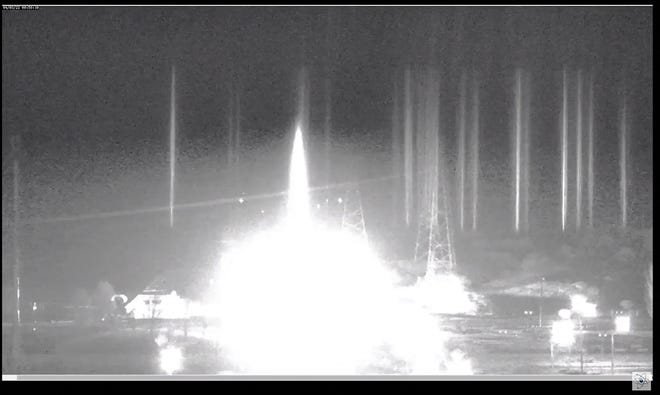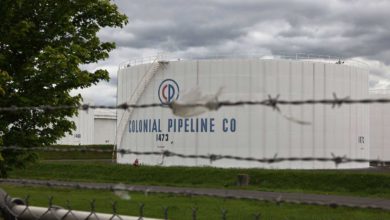
Ukrainian authorities on Friday said the fire at Europe's largest nuclear power plant that prompted widespread concern has been extinguished following an overnight Russian attack in the area.
Ukraine’s state emergency service announced on Facebook on Friday that “the fire in the training building of Zaporizhzhya NPP in Enerhodar was extinguished. There are no victims.” It did not mention the fire in a reactor building that had raised international concern.
The regional military administration said in a statement that the fire at the Zaporizhzhia plant in Enerhodar was extinguished and that there is damage to the compartment of reactor No. 1 but it does not affect the safety of the power unit.
No information was immediately available about casualties. The military administration said Russian forces took control of the site and that operational personnel ensured its safe operation.
The attack on the eastern city of Enerhodar and its Zaporizhzhia nuclear plant came as the invasion entered its second week and another round of talks between Russia and Ukraine yielded a tentative agreement to set up safe corridors to evacuate citizens and deliver humanitarian aid.
The assault led to phone calls between Ukrainian President Volodymyr Zelenskyy and U.S. President Joe Biden and other world leaders. The U.S. Department of Energy activated its nuclear incident response team as a precaution.
— Celina Tebor

Latest developments:
►China says it is “seriously concerned about the safety and security” of nuclear facilities in Ukraine following the nuclear plant blaze ignited by Russian artillery fire.
►Trading on the Moscow exchange will be closed Friday as Russia’s ruble has lost about 5% against the U.S. dollar, further plunging since Western governments imposed sanctions that cut off much of the country's access to the global financial system.
►On Thursday, Ukraine said it has agreed with Russia to create safe corridors backed by cease-fires to evacuate civilians and deliver aid as the parties engaged in a second round of negotiations amid Russia's ferocious assault on its neighbor.
►The Pentagon said it established a direct communication line Tuesday with the Russian ministry of defense “for the purpose of preventing miscalculation, military incidents, and escalation.”
►Acclaimed soprano Anna Netrebko has withdrawn from her upcoming New York performances after not complying with the Metropolitan Opera's condition that she repudiate her public support for Putin, the Met said on Twitter.
►Heavy fighting is continuing on the outskirts of a strategic port city on the Azov Sea, Mariupol. The city’s regional governor, Pavlo Kyrylenko, said Thursday night that power, water, heating and food deliveries to the city have been cut.
Quick links:
GET THE LATEST UKRAINE UPDATES:We'll email you the latest news once a day.
'BOMBS, BOMBS, BOMBS':Ukrainian refugees describe harrowing journey to Poland
Wester leaders condemn Russian attacks after nuclear plant fire
The office of British Prime Minister Boris Johnson says he will seek an emergency U.N. Security Council meeting after Russian troops in Ukraine attacked a nuclear power plant and sparked a fire.
Johnson’s office says he spoke to Ukrainian President Volodymyr Zelenskyy in the early hours of the morning. He says Britain will raise the issue immediately with Russia and close partners.
“The Prime Minister said the reckless actions of (Russian President Vladimir) Putin could now directly threaten the safety of all of Europe,” Johnson’s office said in a statement. “He said (the United Kingdom) would do everything it could to ensure the situation did not deteriorate further.”
Canadian Prime Minister Justin Trudeau says he also spoke with Zelenskyy about the attacks on the power plant.
“These unacceptable attacks by Russia must cease immediately,” he said on Twitter.
— Associated Press
Fire at nuclear plant sparked fears of 'Fukushima-style meltdown'
Fears of an unprecedented nuclear disaster spread rapidly overnight when part of Europe’s largest nuclear plant caught on fire as Russian forces shelled the area.
Amid a stream of confusing, alarming, and, at times, conflicting information about the incident, The International Atomic Energy Agency soon said the "serious situation" had not affected essential equipment at the Zaporizhzhia Nuclear Power Plant and that there had been no change in radiation levels.
Jon B. Wolfsthal, former senior director for arms control and nonproliferation at the National Security Council, tweeted that the Zaporizhzhia power plant was "inherently more safe and protected than the Chernobyl."
James M. Acton, co-director of the Nuclear Policy Program at the Carnegie Endowment for International Peace. echoed Jennex's assessment of the danger posed by the Russian attack, saying the fire could result in a "Fukushima-style meltdown."
In that nuclear incident in Japan, a massive earthquake and tsunami in 2011 destroyed the Fukushima plant’s cooling systems, triggering the meltdown of three reactors and the release of large amounts of radiation, and causing more than 160,000 people to evacuate.
The Chernobyl disaster, while geographically close, was caused by a different process, Acton told USA TODAY. It was caused by operator error and led to a different level of danger — a situation where the nuclear fuel explodes. Read more here.
— Joel Shannon
Ukrainians in U.S. granted temporary protection from deportation
The Department of Homeland Security on Thursday announced temporary protected status (TPS) for Ukrainians living in the United States, which will shield them from deportation for the next 18 months, as Ukraine battles ongoing attacks from Russia.
“Russia’s premeditated and unprovoked attack on Ukraine has resulted in an ongoing war, senseless violence, and Ukrainians forced to seek refuge in other countries,” Homeland Security Secretary Alejandro Mayorkas said in a statement. “In these extraordinary times, we will continue to offer our support and protection to Ukrainian nationals in the United States.”
Individuals must have continuously lived in the U.S. since March 1 to be eligible for TPS, DHS said. That would apply to approximately 30,000 Ukrainian nationals. Those who attempt to travel to the U.S. after March 1 do not qualify for TPS.
— Rebecca Morin
Black and brown refugees are being turned away at European borders
As increasing reports indicate people of color fleeing Ukraine are facing discrimination at the border, the crisis has once again highlighted a double standard in the way nations treat refugees based on country of origin, race, religion and more, academics and refugees say.
Many of the same European nations that turned away refugees from the Middle East, Africa and Asia in the past are now largely welcoming refugees from Ukraine.
"It's great that Europe is being welcoming toward Ukrainian refugees. That should be the response,'' said Nell Gabiam, an associate professor at Iowa State University who studies forced migration. "But it would be even better if that response was applied across the board toward all refugees who are fleeing persecution and war."
Filippo Grandi, United Nations High Commissioner for Refugees, commended governments and citizens for their "extraordinary acts of humanity and kindness" but acknowledged some refugees have faced "a different treatment" at the border. Read more.
– Grace Hauck
Contributing: The Associated Press










